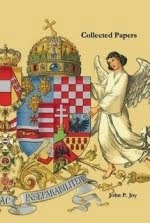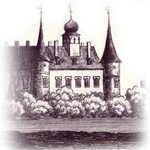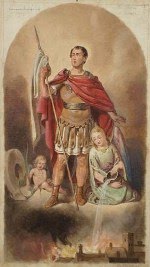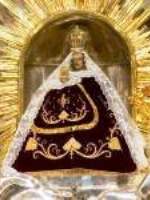The Church commemorates by two feasts the martyrdom suffered by our Lady in union with the Passion of Her Son. The first feast especially commemorates the Compassion of Mary; the second, kept on September 15, the devotion to the Seven Sorrows.
The Seven Sorrows of Mary are: (1) The Prophecy of Simeon; (2) The Flight into Egypt; (3) The Loss of Jesus in the Temple; (4) The Meeting of Jesus and Mary on the Way of the Cross; (5) The Crucifixion; (6) The Taking Down of the Body of Jesus from the Cross; (7) Jesus laid in the Tomb. (See also the
Fish Eaters)

And thy own soul a sword shall pierce
(picture taken by Lisa at St. Peter's Abbey Church, Salzburg)
The Sequence for today's Mass is the haunting Stabat Mater dolorosa, which is also sung during Benediction throughout Passiontide.
At the cross her station keeping,
Stood the mournful Mother weeping,
Close to Jesus to the last.
Through her heart, His sorrow sharing,
All His bitter anguish bearing,
Now at length the sword has passed.
Oh, how sad and sore distressed
Was that Mother highly blessed
Of the sole-begotten One!
Christ above in torment hangs,
She beneath beholds the pangs
Of her dying, glorious Son.
Is there one who would not weep
Whelmed in miseries so deep
Christ's dear Mother to behold?
Can the human heart refrain
From partaking in her pain,
In that Mother's pain untold?
Bruised, derided, cursed, defiled,
She beheld her tender Child,
All with bloody scourges rent.
For the sins of His own nation
Saw Him hang in desolation
Till His spirit forth He sent.
O thou Mother! fount of love,
Touch my spirit from above,
Make my heart with thine accord:
Make me feel as thou hast felt;
Make my soul to glow and melt
With the love of Christ, my Lord.
Holy Mother, pierce me through,
In my heart each wound renew
Of my Savior crucified.
Let me share with thee His pain,
Who for all our sins was slain,
Who for me in torments died.
Let me mingle tears with thee,
Mourning Him Who mourned for me,
All the days that I may live.
By the Cross with thee to stay,
There with thee to weep and pray,
Is all I ask of thee to give.
Virgin of all virgins best!
Listen to my fond request:
Let me share thy grief divine;
Let me, to my latest breath,
In my body bear the death
Of that dying Son of thine.
Wounded with His every wound,
Steep my soul till it hath swooned
In His very Blood away;
Be to me, O Virgin, nigh,
Lest in flames I burn and die,
In His awful Judgment Day.
Christ, when Thou shalt call me hence,
Be Thy Mother my defense,
Be Thy Cross my victory.
While my body here decays,
May my soul Thy goodness praise,
Safe in paradise with Thee. Amen.




















 Here we all are last night at dinner. Some of the students (all men, as the women cooked a meal on Holy Thursday) organized and cooked a really remarkable Easter feast for us all last night. Lentil and French onion soups, pizza, pasta, salad, deliciously tender and flavorful lamb, garlic potatoes, an international array of desserts, and plenty of beer and wine all throughout.
Here we all are last night at dinner. Some of the students (all men, as the women cooked a meal on Holy Thursday) organized and cooked a really remarkable Easter feast for us all last night. Lentil and French onion soups, pizza, pasta, salad, deliciously tender and flavorful lamb, garlic potatoes, an international array of desserts, and plenty of beer and wine all throughout. After dinner, Anna and I took Maria home to bed (it was about 9:30 when the meal was finally finished). The students continued the festivities by singing Easter hymns. As you can see above, Will was quite willing to join the other singers!
After dinner, Anna and I took Maria home to bed (it was about 9:30 when the meal was finally finished). The students continued the festivities by singing Easter hymns. As you can see above, Will was quite willing to join the other singers!

























